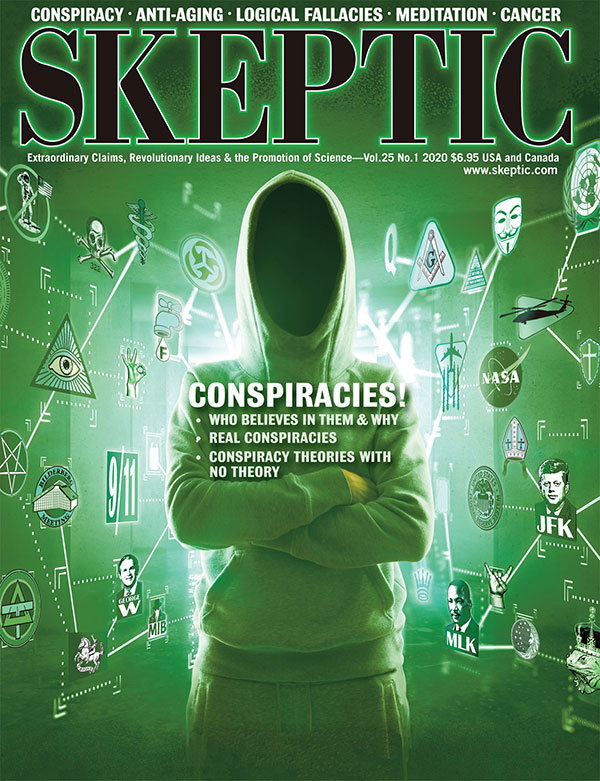Are we living in a Post-Truth era of fake news and alternative facts? Has Left-Wing postmodernism and Right-Wing politicization of the world distorted reality beyond recognition? In response to the cover story of Skeptic magazine 25.1 (2020) by Steven Pinker that we are not living in a post-truth era, Dr. Lee McIntyre avers that we must take seriously the threat to truth posed both by those who would subvert the truth for political gain, and also by those who would deny that such a threat actually exists.
Read Dr. Michael Shermer’s response to McIntyre.
Some people deny facts and truth. Others deny that facts and truth are in any danger. Both are wrong. In his recent essay titled “Why We Are Not Living in a Post-Truth Era” (Skeptic, Vol. 24, No. 3), Steven Pinker argues not only that we are not living in a post-truth era, but that the very idea of post-truth is something of a contradiction in terms. He begins with a glib argument borrowed from a philosopher’s response to relativism:
Consider the statement “We are living in a post-truth era.” Is it true? If so, it cannot be true.
That is, to say we are living in a post-truth era is itself to make a truth claim…which demonstrates that truth must matter after all.
But who said that it didn’t? The idea of post-truth has often been misunderstood, by Pinker and others, to reduce to one of several straw men:
- that truth doesn’t matter,
- that no one really cares about truth anymore,
- that no one can find the truth,
- and that if we were actually living in a post-truth era, we should just give up.
Instead, the claim that we live in a post-truth era is properly based on the idea that truth today is under threat. Our society has an infection that needs to be treated, even if it is not quite yet lifethreatening. Isn’t it therefore possible that claims 1–4 above are false, yet we should still take the idea of post-truth seriously?
We live in a time when far too many people— especially those in positions of power—lie about or ignore reality, and seem to pay no political price for it. In my book Post-Truth (MIT Press, 2018), I define post-truth as the “political subordination of reality.” It is a tactic in the authoritarian toolbox, whereby disinformation is used not simply to convince someone that a falsehood is true, but to so overwhelm the information stream with fakery that it can cause the citizenry to give up on the idea of facts and truth all together. As Jason Stanley points out in his outstanding book How Propaganda Works, propaganda is not meant to convince you, but to show you who’s boss. A true authoritarian does not need your cognitive consent. Instead, their message is: “I am so powerful that I can dominate your reality, and there is nothing you can do about it.”
The eminent historian of fascism Hannah Arendt provides the parallel for our present situation when she observes that “the ideal subject of totalitarian rule is not the convinced Nazi or the convinced communist, but people for whom the distinction between fact and fiction…true and false…no longer exist.” In his 2017 book On Tyranny, Tim Snyder makes the point even more succinctly: “post-truth is pre-fascism.”
Perhaps it’s a matter of degree and timing. I agree with Pinker when he observes that the manipulation of information is hardly new, and that politicians have always lied, dissembled, and distorted the facts. But post-truth is not mere lying or distortion. While it may involve the spread of falsehood, its purpose is political, not epistemological. With post-truth, no one is asking for your agreement.
When President Trump notoriously took a sharpie to a NOAA weather map so that he was “not wrong” about the path of Hurricane Dorian (drawing its moving path to include territory Trump said it would), most of the country just laughed at him. But isn’t this tactic identical to his chilling insistence, just after the massacre at the Tree of Life synagogue in Pittsburgh, that he was justified in holding a rally that night because the NYSE was open the day after 9/11? When it was pointed out to Trump that this was in fact false (the NYSE was closed for six days after 9/11), it did not seem to matter. Trump went on to hold his rally not because his lie had convinced anyone, but because there was no political price for it.
Pinker is well known these days for his optimistic contention (he calls it realistic), in his 2018 book Enlightenment Now, that we are living in what by many measures is the best era of human history. So why all the catastrophizing? As Pinker points out in his post-truth essay, fake news constituted less than 1% of online communication in the run up to the 2016 election, and even that seemed targeted toward people who had already made up their minds. How to square this, though, with the conclusion from the same study that Pinker cites that the penetration of false stories reached over one quarter of the American electorate, with unknowable consequences for its outcome? Such unknown costs may be negligible; then again, they may be non-negligible, in which case concerns about the hacking of the 2020 election may be justified. Here it would seem the precautionary principle may apply.
While Pinker’s cheery graphs and statistics may be accurate, they do little to assuage our sense that the risk to facts and truth during the Trump era is a potential crisis for democracy. Of course, Pinker might point out that such alarm could (ironically) itself be due to the degree to which we are succumbing to worry and emotion that is coloring our beliefs about post-truth itself! Yet perhaps it is possible that, even while Pinker’s measures of well being are all valid, the risks are nonetheless higher as well. Think of the analogy here with war. Couldn’t it be true that while we are living in one of the most peaceful eras of human history, we also live in a time of greatest threat in that a single (nuclear) war could wipe out humanity? Even Pinker admits this to be the case in both Enlightenment Now and in The Better Angels of Our Nature, in which he made clear his support for a nuclear-free world.

This article appeared in Skeptic magazine 25.1
Buy print edition
Buy digital edition
Subscribe to print edition
Subscribe to digital edition
To say that we now live in a post-truth era does not mean that no one believes in truth or that all of the progress of science and reason has been wiped out; it means that despite the fact that millions of us still care about truth, we feel helpless in watching the standards of evidence and accountability erode before our eyes. To make the claim that we could not be living in a post-truth era because too many people care about truth is like saying that we could not be living in a era of institutional racism, because there are so many people these days who are attuned to the problems of race.
I am also in robust agreement with Pinker on the importance of science and reason: we should not deny facts, truth, and reality. Where we seem to disagree is on the question of whether science and reason are under genuine threat. The threat to truth is posed both by those (like Trump) who would subvert the truth for political gain, and also by those who would deny that such a threat actually exists.
Even if Pinker is right that we are now living in an era of extraordinary progress and accomplishment, it may all come crashing down if we don’t take the threat from post-truth seriously. ![]()
Read Dr. Michael Shermer’s response to McIntyre.
About the Author
Dr. Lee McIntyre is a Research Fellow at the Center for Philosophy and History of Science at Boston University. He is the author of Post-Truth (MIT Press, 2018) and The Scientific Attitude: Defending Science from Denial, Fraud, and Pseudoscience (MIT Press, 2019).
This article was published on June 25, 2020.
















The great majority of people in the US believe the experts over Trump on coronavirus matters. There is a hard core which claims to believe him, but maybe this is just a way of signalling which side they are on. Partisanship does take precedence over truth for many people and that has always been the case.
Is there less truth now in the U.S. than in Stalin’s USSR or Hitler’s Germany? We do still have free media, that is not controlled by the state. There is obviously considerable tendency to deny facts for political/economic reasons, certainly more than in the past, but we have not arrived yet at a situation where the state controls all information. There is certainly danger if the Republican party continues its strategy and if a more competent leader than Trump is found by them. There is no central leftist authority that relies on denying truth – most of the political-correctness practices seem to be reaction against rightist propaganda. Pinker was over-optimistic, but that does not mean we are actually in a post-truth era.
Yes, some people like Trump are distorting the truth and telling lies, but this hardly means we are living in a post-truth era. Knowing the truth and valuing it helps us survive.
The ‘system’ deleted a my first sentence, a quotation from the article:
“That is, to say we are living in a post-truth era is itself to make a truth claim…which demonstrates that truth must matter after all.” I hope the rest of my previous comment now makes greater sense.
“This may belong…’ etc.
This may belong in a category of statements: logicians and computer programmers understand things differently from ‘normal people’. Another example of dubious logic based on supposed self-contradiction is: ‘To say that value judgements should be avoided is itself a value judgement.’ We should expect better from public intellectuals.
Whether true or useful, the following are wise:
‘Tolerate all but the intolerant’. ‘Freedom requires restraints.’ This are statements that are operationally valid guides to political life despite their seemingly paradoxical form. Pseudo-logic is not the pathway to Truth or truth. Complexity of our reality means we gain insights and aspects of truth. Of course, some simple statements made by Trump may properly be regarded as false. Pre-fascist? A separate topic.
This article is perfect example of unhinged Leftist projection, it is laughable.